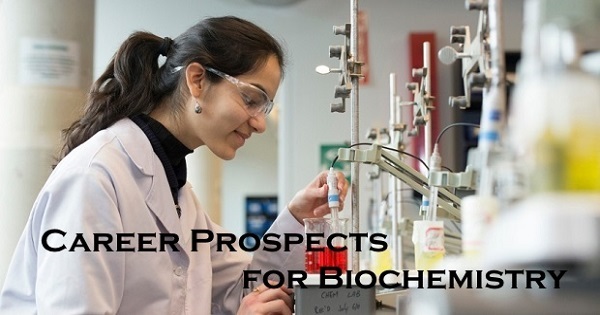

- Home »
- Career Center »
- Science »
- Biochemistry »
Career in biochemistry
Naief Khatri

Modern medicine is marching along in great big strides, riding on the incredible success that biochemistry has enjoyed for about a century now. This interdisciplinary study reduces biological processes (reproduction, aging, genetics) to their chemical identity for easier comprehension. It’s not all internal though; external environmental influences have large effect on all living things and biochemists must tackle that mystery as well. The biochemist must embrace a large field of study at both micro-levels (studying carbohydrates, enzymes and fats and their functions at the cellular level) and macro-levels (studying respiration, metabolism) and more or less everything else related to the biological process.
Who Can Take Up Biochemistry?
Science stream students fresh out of 10+2 with minimum 50% marks can opt for a B.Sc. in Biochemistry. At the Masters level, B.Sc. degree holders can go for an M.Sc in Biochemistry and M.B.B.S degree holders for an MD in the same.
What sort of personality type is fit for Biochemistry?
Any research-oriented field like biochemistry requires someone who loves to be committed to a taks. They must have keen observational skills and a curious bent of mind. Because biochemists work in a research group, teamwork ability is a must among young aspirants.
Biochemistry career prospects
Biochemistry career opportunities can be virtually limitless: private research institutions, hospitals, government agencies, social and non-profit organisations all hunt for good biochemists. Their goals are usually similar – to research, experiment, conduct trials and find cures for diseases like cancer and AIDS and even mental disorders. Pharmaceuticals keep a sharp eye out for biochemistry professional. Private R&D jobs are among the most lucrative options for a newly minted biochemist.
Read:Agriculture Science
So where does a newly minted biochemist go?
Medicine: the main bastion of this profession, medical biochemistry seeks to identify the causes of disease, understand their transference from one generation to the other, understand their effect on the body in chemical terms and try and isolate the indicators that signal impending disease. This requires tracking chemical changes through normal bodily functions like muscle contraction, respiration etc.
Agriculture: In many parts of the world, people are already facing a food shortage but biochemists are mitigating that damage by developing cultivation innovations, improving pest control and optimising crop storage. And this needs to be made even better.
Nutrition: The thousands of different diet patterns in the human world are built on some near invariable essentials such as minerals, proteins, carbohydrates, fats and vitamins. The biochemist’s job is to investigate their effect on the human body in cases of excess or scarcity of these essentials.
How much is a biochemist paid?
The great demand in this field means that even a trainee can command a pay check of anything between Rs. 8000 – Rs. 150000. Add experience and the figure skyrockets. MNCs and other private bodies offer a higher salary.
Read:
Biochemistry University/Institutes
So where can one get a biochemistry degree?
Courses : B.Sc (Hons.)/, B.Sc (p)/3 Yrs.
Eligibility : 10+2 with 40%50% in chosen subjects.
Courses : B.Sc/3Yrs.
Eligibility : 10+2 with 55% in relevant sub.
Courses : B.Sc(Hons)/3Yrs.
Eligibility : 10+2 with40%
Courses : B.Sc(Hons.Human Biology)/3Yrs.
Eligibility : 10+2 PCM/60%entrance test
Courses : M.Sc, M.Sc.(Med. BioChem)
Eligibility : B.Sc.with60%M.Sc.(Chem)or MBBS
Courses : MTech.(5Yrs.Integrated)
- Indian Institute Of Technology
Eligibility : 10+2 PCM/entrance testCourses : B.Sc(H.Sc.and Bio chem.)3 Yrs
- Kurukshetra University
Eligibility : 10+2Courses : B.Sc 3 Yrs.
- Punjab Agriculture University
Eligibility : 10+2Courses : B.Sc 3 Yrs.
- Punjab University , Chandigarh
Eligibility : 10+2Courses : B.Sc 3Yrs
- Sardar Patel University
Eligibility : 10+2Courses : B.Sc 3Yrs
- University Of Mumbai
Eligibility : 10+2Courses : M.Sc 2 Yrs
- Aligarh Muslim University
Eligibility : B.Sc. with 55%Courses : M.Sc.2 Yrs, M.Tech.(Bio .Chem)
- Banaras Hindu University
Eligibility : B.Sc. with 55%B.Tech.Courses : MS, M.Sc.(Med. BioChem)
- M S University Of Baroda , Varodara
Eligibility : B.Sc.Courses : M.Sc.
- All Indian Institute Of Medical Sciences
Eligibility : B.Sc.(Hons)/B.Sc.(Bio)/BVSC/MBBS
Latest News
People Reading Now

CBSE Compartment Result 2023 OUT: Click For Direct Link



CSAB 2023: Special Round Registration Begins Today


